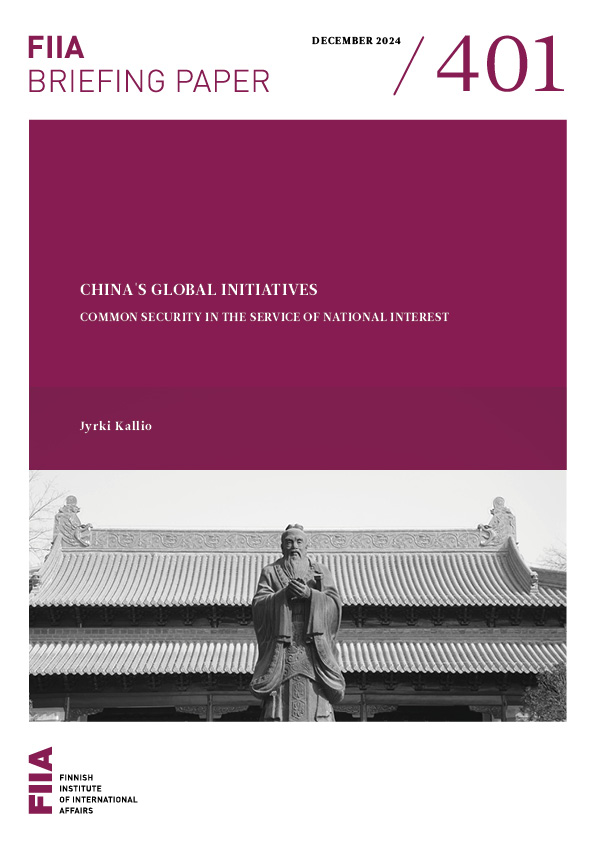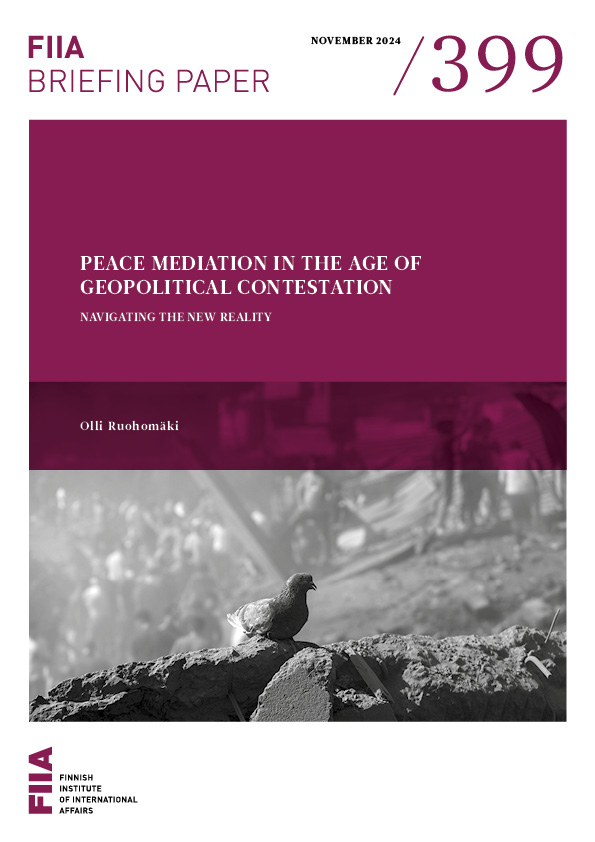Targeted sanctions are political acts that infringe upon the enjoyment of fundamental rights by designated individuals and entities, especially the rights of defence and the right to an effective remedy. Increasing international attention has therefore been paid to the legal implications of targeted sanctions.
Targeted sanctions must meet basic standards of fair and clear procedures not only to guarantee the rights of individuals, but also in order to be a credible and effective foreign policy tool.
To date, concerns over fair treatment have been addressed in a fragmented and piecemeal way. Judicial review before European courts has provided an important incentive for change, especially for the creation of the office of the UN Ombudsperson.
A holistic approach should be developed, which not only emphasizes retrospective review of sanctions, but would also address concerns in the initial phase of their adoption. Increased attention should be paid to the use of confidential information and the right of designated individuals to receive information.
Efforts to strengthen legality aspects in the use of targeted sanctions must take account of the circumstances in which these measures are taken. Concerns for international peace and security, and especially for the authority of the Security Council, must be balanced against the protection of fundamental rights.
Introduction
International debate shows increasing concern for the legal implications of sanctions regimes. Uni-lateral and collective sanctions are widely discussed from the perspective of accountability, the rule of law and judicial review. Moreover, many individuals and entities have been successful in challenging the designation of sanctions upon them.
All these aspects highlight the need to place the sanctions debate in a larger accountability framework where not only the behaviour of the target state is scrutinized, but increasingly the actions taken by the sender state(s) as well. The general sentiment of unfairness that surrounds targeted sanctions needs to be addressed, while the possibility of imposing sanctions that are truly wrongful cannot be dismissed.
Due process concerns are important not only because targeted sanctions are highly discriminatory and affect the ordinary life of designated individuals and entities, but also because of the credibility and effectiveness of sanctions as a foreign policy tool. Unless the concerns for legalism are addressed, the credibility of sanctions will be lost as the controversy surrounding them will increase. If sanctions are continuously overturned on procedural or substantive grounds, the whole idea of smart sanctions will be undermined.1
It is also important from a principled point of view that procedural safeguards that have been developed in national and regional settings are not overturned. This would open the door for a double standards argument according to which Western states do not practise what they preach.
The aim of this paper is to discuss how targeted sanctions as a foreign policy tool increasingly encroach upon the legal sphere. The paper will provide an overview of the effect of sanctions upon designated individuals, in addition to which it will explore how the UN and European institutions have approached the balancing of security concerns with the protection of fundamental rights. To conclude, thoughts on how to move forward will also be presented, which stress not only retrospective review, but a holistic approach where legality aspects are taken into account in all phases of sanction practices.
Targeted sanctions and the individual
The nature of targeted sanctions
Targeted sanctions are imposed in response to various measures ranging from terrorism to despotic regimes. They are directed against specific individuals or entities instead of whole countries, and they seek to suppress and prevent unlawful behaviour through the imposition of, for example, travel bans or the freezing of assets.
Within the UN system, sanctions are adopted in order to protect international peace and security, which is the paramount interest of the Security Council. The powers of the Security Council are broad in this task and the question emerges as to whether due process considerations should interfere with or divert interest from the real issue of collective security. Concerns for individuals are thus often seen to be at odds with the public good.
Individual sanctions affect the ordinary life of designated individuals and entities in many respects. Listed individuals are unable to open a bank account, for instance, or obtain a job because anybody paying the person would be committing a crime. Thus, earning one’s living becomes impossible.
The person may be banned from travelling and may thus be prevented from seeing his or her family, or from seeking medical help if needed. Not even humanitarian exemptions that allow for some travelling or funding undo the total infringement upon the enjoyment of basic rights.
Sanctions resemble a criminal punishment in the effect they have on the individual. They severely restrict the enjoyment of individuals’ rights, they last for many years, in addition to which they severely stigmatize the designated individuals and entities. In fact, targeted sanctions against individuals have even been called ‘a new sui generis type of international responsibility’.2 The consequences of sanctions may be perceived to be even harsher in circumstances where those that are sanctioned are not the ‘real’ targets. For example, the EU’s sanctions upon Russia target those close to President Putin in order to exert pressure on the Russian government.
The procedure whereby targeted sanctions are adopted and implemented is disadvantageous for the individual or entity. Individuals are often listed based on confidential information and the listing involves a surprise element in order for the targets not to be able to take avoidance actions, such as transferring assets before a freeze is imposed. These aspects of targeted sanctions have many implications for the individual.
First, it may be difficult for the designated individual or entity to ascertain the reasons behind the listing, and hence how to change the behaviour in order to be delisted. Second, the lack of transparency due to confidential information makes it difficult to challenge one’s case; if the designated individual or not even a judicial organ empowered to review the listing are allowed to see confidential documents, it becomes hard to dispute and decide the case. As a consequence, courts may even be forced to find in favour of the applicant because they have no recourse to relevant material in order to make a proper finding.
Another complicating factor from the designated individual’s or entity’s perspective is the multilevel nature of targeted sanctions. Behind sanctions there is often an international chain of actors, who have all taken part in the sanctions in one way or another. This multiplicity of actors involved makes it hard to pinpoint who ultimately bears responsibility for the sanctions internationally. For example, a decision to instigate targeted sanctions taken in the Security Council must be implemented at the national level. But even though states implement the sanctions, they are not the reason that measures are undertaken because the sanctions originate from the UN. States find themselves between a rock and a hard place; they are bound by virtue of Article 25 in the UN Charter to implement Security Council decisions, yet they may have numerous international human rights obligations and a long tradition of due process in their internal legal order that stands in contradiction to the UN sanctions procedure.
Minimum procedural safeguards
Most legal systems share some common principles that relate to fair and clear procedures. In addition, not even international organizations can completely evade all human rights. The Security Council is bound by the UN Charter, which stresses fundamental human rights protection. In addition, peremptory norms of international law cannot be violated. Thus, there are some basic standards to be followed when sanctions are sketched out, although the outer contours of the obligations may be unclear. As a minimum, it has been claimed that the following components form the nucleus of procedural guarantees: 1) the right to be informed; 2) the right to be heard; 3) the right to be advised; and 4) the right to an effective remedy.3
However, many open questions remain on how to devise targeted sanctions so that they comply with the idea of fundamental rights. Thus far, the approach has been piecemeal; each institution involved in the adoption and implementation of sanctions has developed their own strategy on how to improve the system. Small steps have been taken to improve the standing of targeted individuals in order to meet the critique presented by judicial institutions or comparable bodies.
Judicial review before European institutions
A decisive catalyst for improving the procedural safeguards of individuals and entities subjected to targeted sanctions came from Europe with the Kadi case in response to the UN terrorist listings. The rights of the Saudi Arabian national Yassin Abdullah Kadi were contested before the EU’s Court of First Instance (CFI, later renamed the General Court) in 2005,4 following his listing on the 1267 UN Al-Qaida list for suspected terrorist ties. Although the CFI dismissed the complaints, the Court of Justice as the highest judicial authority in the EU took the opposite view. It established that Mr Kadi’s rights had been infringed: he had not been informed of the reasons for the listing, which deprived him of the opportunity to challenge the freezing of his assets. His right to be heard and to an effective remedy, as well as the right to property, were thus violated and the EU was forced to annul the regulation through which the UN Al-Qaida listings had been transposed.
As with many other successful challenges of listings before the EU Courts, Kadi was, however, re-listed immediately by a new EU regulation. New proceedings ensued before the EU General Court (Kadi II), and subsequent appeals. In 2013, the Court of Justice of the EU delivered its final judgment in respect of Mr Kadi, who won his case before the EU. The Court held that the rights of the defence and the right to effective judicial protection had been violated because of the lack of access to information and evidence against Mr Kadi.5 The Court further laid down that it is the task of the European Union authority to provide well-founded evidence for sanctioning individuals or entities, while the EU Courts in assessing the evidence must strike a balance between international peace and security on the one hand, and individual rights on the other.
Due process is not only problematic when it comes to sanctions that derive from the UN, however. Similar dilemmas characterize the EU’s own autonomous sanctions. The latest case in which this was proven relates to the terrorist listing of Hamas, which the entity was able to successfully revoke in December 2014. The EU General Court decided that Hamas must be removed from the EU’s terrorist list because the designation had taken place based ‘on factual imputations derived from the press and the internet’, not well-founded evidence.6 This corroborates previous findings that sanctions upon individuals and entities must be backed by strong evidence which can clearly be tied to the individual or entity in question.
Targeted sanctions have also been dealt with by the European Court of Human Rights (ECtHR), which has twice issued a judgment on the compatibility of human rights obligations under the European Convention and the obligation to implement Security Council resolutions. In Nada v. Switzerland,7 the ECtHR found that Switzerland had violated its human rights obligations in its implementation of the UN sanctions by imposing an entry and transit ban upon Youssef Nada, who lived in an Italian enclave surrounded by a Swiss canton.
According to the Court, Switzerland had insufficiently harmonized its two conflicting international obligations, and had therefore violated Mr Nada’s right to a private and family life, as well as his right to an effective remedy. The Court held that Switzer-land had some real latitude in implementing the UN sanctions and could therefore have taken better account of the applicant’s individual situation. The Court further held that national courts should be able to judge on the national implementation measures of the UN sanctions, even though they are unable to pronounce generally on UN measures.
The second case was also brought against Switzerland by a designated individual of targeted sanctions. In the case of Al-Dulimi,8 the ECtHR found that Switzerland had violated its obligations under the European Convention by confiscating the property of Iraqi national Khalaf Al-Dulimi and the company Montana Management Inc. While the European Convention of Human Rights guarantees access to remedy, the Court noted that there can be limitations on this right as long as they are justified and proportionate, namely the means employed are proportionate to the aims to be realized. Finally, the Court held that Switzerland had violated Al-Dulimi’s and the company’s right to an effective remedy by stating: ‘as long as there is no effective and independent judicial review, at the level of the United Nations, of the legitimacy of adding individuals and entities to the relevant lists, it is essential that such individuals and entities should be authorised to request the review by national courts of any measure adopted pursuant to the sanctions regime’.9
Due process at the UN
Although a decisive push to move forward with respect to due process of individuals and entities that are targeted by UN sanctions might have come from Europe, the need to ‘ensure that fair and clear procedures exist for placing individuals and entities on sanctions lists and for removing them, as well as for granting humanitarian exemption’ was recognized by the UN Member States as early as 2005 in the World Summit Outcome Document. Due process concerns had emerged especially with respect to the UN sanctions regimes on Al-Qaida and/or the Taliban; both include a high number of individuals and entities in addition to which there is no direct connection to any country.10
The first measure undertaken by the Security Council in pursuance of addressing due process concerns was to create a so-called Focal Point for Delisting in 2006. This body does not, however, provide for independent review since the power of delisting resides elsewhere. Its task is rather to put the state which has designated the target of the sanction in touch with the state of nationality or residence. Despite its meagre role, the Focal Point is important because it deals with the full range of UN sanctions regimes.
The UN Ombudsperson
With respect to the UN Al-Qaida sanctions, a definite improvement in due process was achieved with the creation of the UN Ombudsperson in December 2009. The Ombudsperson is an independent and impartial office, initially established for an 18-month period, and tasked with reviewing requests from individuals and entities seeking to be removed from the UN Al-Qaida sanctions list. For the position, the Security Council looked for ‘an eminent individual of high moral character, impartiality and integrity with high qualifications and experience in relevant fields’,11 to which it appointed Canadian Kimberly Frost.
The approach taken by the Ombudsperson towards the review process emphasizes balancing of interests. On the one hand, the Ombudsperson stresses fundamental concepts that are found across legal systems, which seek to protect the procedural rights of accused persons; on the other hand, the review standard must take account of the express acknowledgement by the Security Council that national criminal legal standards are not applicable under the Ombudsperson’s mandate. The standard of review developed by the Ombudsperson is consequently ‘whether there is sufficient information to provide a reasonable and credible basis for listing’.12
Upon receipt of requests for review by individuals and entities on the Al-Qaida list, the Ombudsperson gathers relevant information on the delisting request, after which a dialogue follows with the petitioner as well as concerned parties. This phase gives the petitioner an opportunity to be heard so that the circumstances of the case are fully understood. A comprehensive report is then prepared by the Ombudsperson, which recommends delisting or not. If delisting is recommended, the Sanctions Committee overseeing the list must by consensus decide otherwise within 60 days. If the Sanctions Committee is unable to reach a consensus, the issue can be referred to the Security Council.
The Ombudsperson has handled 50 cases to date, of which 42 have resulted in delisting. Although this review process represents a significant step forward for individuals and entities seeking relief from being subjected to sanctions, many problems remain. First, the office of the Ombudsperson is limited in time, which means it is not a permanent review mechanism. Additionally, there have been problems with extending the Ombudsperson’s work contract to cover the full mandate period, and general resources have been limited.
Second, the delisting review under the Ombudsperson concerns only those persons placed on the Al-Qaida list, thus leaving numerous individuals designated under other sanctions regimes without an effective remedy. A further limitation is that the Ombudsperson does not have the final say, as the Sanctions Committee, and eventually the Security Council, is able to overturn the Ombudsperson’s recommendations. A final point of criticism, which the Ombudsperson has been unable to alleviate, relates to the Sanctions Committee and its poor practice of delivering reasons for delisting or retention. This not only affects transparency, but also has practical implications as it complicates many parallel proceedings that are ongoing at national and regional level.13
The way forward
When it comes to scrutinizing sanctions, much attention has been paid to the availability of an effective remedy. But fair and clear procedures extend further than retrospective inspection; basic standards should be respected from the initial phase onwards so that legality characterizes the whole process from the adoption of sanctions until they are terminated.
To start with, the listing criteria for targeted sanctions must be formulated clearly, in a way which allows listed persons and entities to correct their behaviour and to challenge the listing.
There must be sufficient grounds for listing individuals or entities, and those targeted must be informed of the reasoning so that they are able to challenge their designations. The confidentiality barrier must therefore be overcome in order for targeted sanctions to work. Some progress has been achieved in this respect. The EU General Court has recently submitted a proposal with regard to disclosure of confidential information in order to improve the situation. The proposal would open up for non-disclosure to the applicant if serious national interests were considered to be at stake.
The issue of retrospective review of targeted sanctions is also controversial. The Court of Justice of the EU noted in 2013 that despite improvements, the UN system fails to provide effective judicial protection.14 Whether this finding will spur further progress in terms of due process within the UN system or not, remains to be seen.
There are divergent opinions in the UN Security Council on the desirability of expanding the Ombudsperson’s review to all sanctions lists. Some of the permanent member states, such as Russia, the United States and the United Kingdom, expressly prioritize tailor-made solutions, which arguably allow for more efficient measures in combating terrorism. Still, many states are prepared to take further steps to strengthen due process. In this regard, the group of Like-Minded States on Targeted Sanctions plays an important role.15
It can and should work to promote the due process idea within the UN, such as permanency of the Ombudsperson’s office, detailed reasoning, and sufficient resources, as well as review for other sanctions regimes. The ongoing High-Level Review of UN Sanctions also guarantees that sanctions are discussed from the perspective of the rule of law.
When it comes to the level of review, the EU Courts seem to push for nothing less than full judicial review before courts.16 But the prospect of judicial review by a court at the UN level seems remote despite some scholarly suggestions for the creation of a Sanctions Review Tribunal. Instead, such a strict position by the EU Courts may turn out to be counter-productive. The Security Council may, instead of being incited to further improve its review system, revert to less targeted sanctions, which makes it more difficult for those subjected to them to challenge the sanctions before national or regional courts.
The path chosen by the EU Courts has also been criticized for neglecting the overall framework within which the Security Council operates. Therefore, the different attempts at the UN to advance sanctions and the rule of law must overcome the concern raised by some Security Council permanent member states that initiatives seeking to transfer policy-making away from the Security Council will challenge the authority of the Council.
Conclusions
The importance of sanctions as a foreign policy tool has increased in recent years, leading to more fine-tuned measures targeting individuals and entities in particular. This particularization has led to further controversy about the compatibility of targeted sanctions with the protection of individual rights. In order for targeted sanctions to be a credible foreign policy instrument, due process concerns must be met. It is crucial to place targeted sanctions within at least a minimalist understanding of the rule of law, namely a climate of legality. This does not mean that considerations of national or collective security must be abandoned.
Different ways to handle confidential information must be created that satisfy all parties in the sanctions processes. The same applies to the availability of independent and impartial review of sanctions designations. Further work must be done to promote and expand review of sanctions regimes, while recognizing that full judicial review is not always within reach. Indeed, the next step must be to strike a balance between those that stress the protection of public good and those that emphasize fundamental rights. Otherwise targeted sanctions will lose their importance.
Endnotes
1 House of Lords, the Select Committee on the European Union, Sub-Committee C (External Affairs), Inquiry on European Union Restrictive Measures, 6 February 2014.
2 Marja Lehto, Indirect Responsibility for Terrorist Acts. Redefinition of the Concept of Terrorism Beyond Violent Acts (Martinus Nijhoff Publishers: Leiden, 2010) p. 377.
3 Bardo Fassbender, Targeted Sanctions and Due Process, Study Commissioned by the United Nations, Office of Legal Affairs, 20 March 2006, p. 8.
4 The judicial institution of the EU comprises three courts, two of which are of relevance to this paper. These are the EU General Court (formerly the Court of First Instance) and the Court of Justice of the EU, which has jurisdiction to decide on, inter alia, appeals against judgments of the General Court. For more information on the EU Courts, see <http://curia.europa.eu/jcms/jcms/Jo2_6999/> (accessed 14 January 2015).
5 Joined Cases C-584/10 P, C-593/10 P, and C-595/10 P, Judgment (Grand Chamber) 18 July 2013.
6 General Court of the European Union, Press Release No 178/14, Judgment in Case T-400/10, Hamas v. the Council, Judgment, 17 December 2014.
7 Case of Nada v. Switzerland, Appl. No 10593/08, Judgment, Grand Chamber, 12 September 2012.
8 Case of Al-Dulimi and Montana Management Inc., v. Switzerland, Appl. No 5809/08, Judgment, 26 November 2013.
9 Case of Al-Dulimi and Montana Management Inc., v. Switzerland, Appl. No 5809/08, Judgment, 26 November 2013, at para. 134.
10 Bardo Fassbender, Targeted Sanctions and Due Process, Study Commissioned by the United Nations, 20 March 2006, p. 4.
11 UNSC Res. 1904 (2009), 17 December 2009, at para. 20.
12 See, http://www.un.org/en/sc/ombudsperson/approach.shtml.
13 Seventh Report of the Office of the Ombudsman, UN Doc. S/2014/73 (31 January 2014), at para. 51.
14 Joined Cases C-584/10 P, C-593/10 P, and C-595/10 P, Judgment (Grand Chamber) 18 July 2013, at para. 133.
15 The group comprises the following countries: Austria, Belgium, Costa Rica, Denmark, Finland, Germany, Liechtenstein, the Netherlands, Norway, Sweden and Switzerland.
16 Joined Cases C-584/10 P, C-593/10 P, and C-595/10 P, Judgment (Grand Chamber) 18 July 2013, at para. 134.







